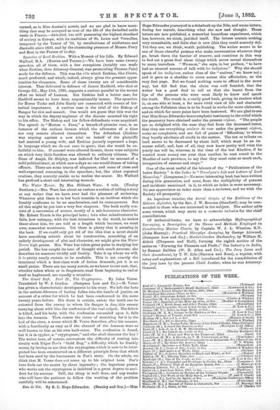Eau de Nil. By E. C. Hope-Edwardes. (Bentley and Son.)—Miss
Hope-Edwardes journeyed in a dahabeah up the Nile, and wrote letters, during her travels, describing what she saw and thought. These letters are now published, a somewhat hazardous experiment, which has, however, we think, justified itself. The letters contain nothing- very remarkable, and little that is new (this they could scarcely do). Yet they are, we think, worth publishing. The writer seems to be one of those cheerful persons who make conversation wherever they go, break down the barrier of reserve, and contrives in this way to find out a great deal about things which never reveal themselves to many travellers. " We seem," she says, in her preface, " to have had an unusual amount of talk with lee indigenes." Why she should speak of lee indigenes, rather than of the "natives," we know not ; and it gave us a shudder to come across this affectation, on the very first page. But we found nothing more to offend in the same way, but did find that the claim was well founded, that the writer has a good deal to tell us that she learnt from the lips of the persons who were most likely to know and speak the truth. The result is, a really good book, giving its readers what is, on one side at least, a far more vivid view of life and character among the Fellaheen than is to be found in works far more elaborate, and on which far more pains have been bestowed. We are glad to see that Miss Hope-Edwardes bears emphatic testimony to the relief which the peasantry have obtained under the present regime. " The people are so delighted with the ease they feel from the decreased taxes, that they see everything couleur de rose under the present regime, make no complaints, and are full of praise of Effendina,' to whom they loyally attribute all credit in the matter. The tax or tribute on land seems to be decreased by about half, which must be an im mense relief; and, best of all, they now know pretty well what the yearly tax will be, whereas, in the time of the last Khedive, if he wanted more money one year than another, he sent round to the Moodirs of each province, to say that they must raise so much each, irrespective of seasons and crops."
One of the most useful of the labours of the " Publications of the Index Society" is the Index to " Trevelyan's Life and Letters of Lord Macaulay." (Loogmans.)—No more interesting book has been written during this generation, and none, from the multiplicity of persons and incidents mentioned in it, to which an index is more necessary. No one appreciates an index more than a reviewer, and we wish the Society all prosperity.
An ingenious treatise, the Astral Origin of the Emblems of the Hebrew Alphabet, by the Rev. J. W. Broome (Stanford), may be com- mended to those who are interested in the subject. The author adds some verses, which may serve as a memoria technica for the chief constellations.
Of technical-books, we have to acknowledge Hydrographical Surveying, a Description of the Means and Methods Employed in Constructing Marine Charts, by Captain W. J. L. Wharton, R.N. (John Murray) ; Practical Blowpipe Assaying, by George Attwood. (Sampson Low and Co.) ; Market-Garden Husbandry, by William-H. Ablett (Chapman and Hall), forming the eighth section of the series on "Farming for Pleastire and Profit ;" Tea Industry in. India, by Samuel Baildon (W. H. Allen and Co.) ; The Jury Laws and their Amendment, by T. W. Erle (Stevens and Sons), a reprint, with notes and explanations, of a Bill introduced for the consolidation of the jury laws by the present Chief Justice, when he was Attorney- General.














































 Previous page
Previous page